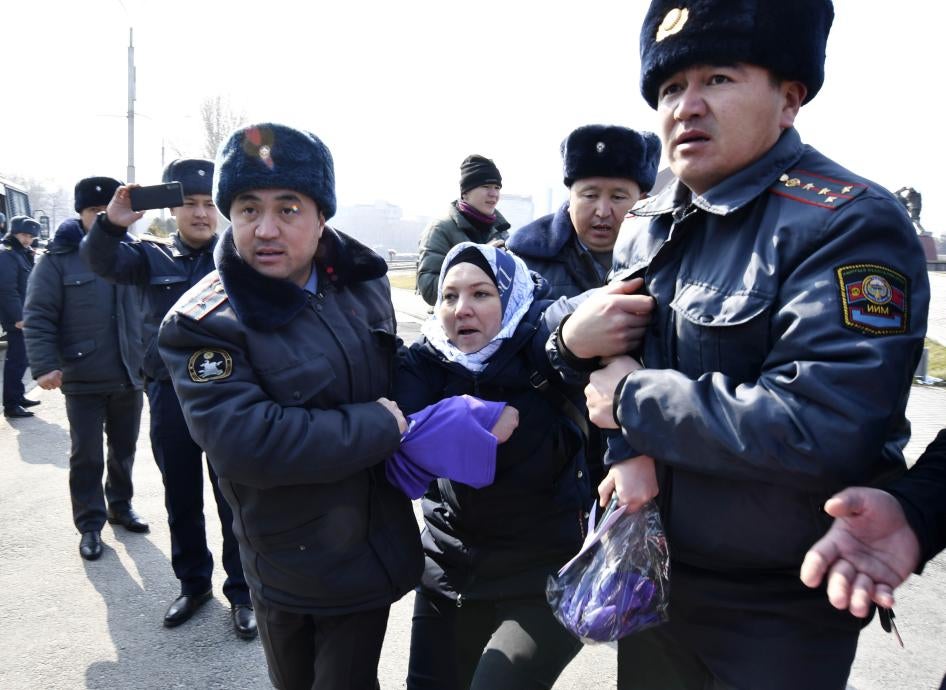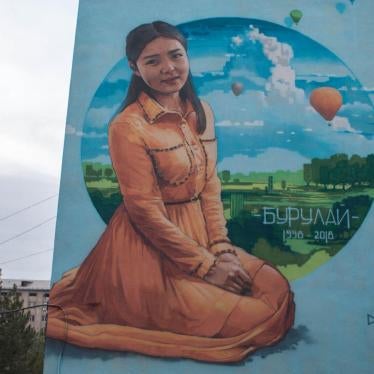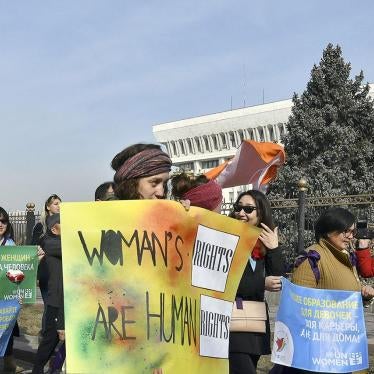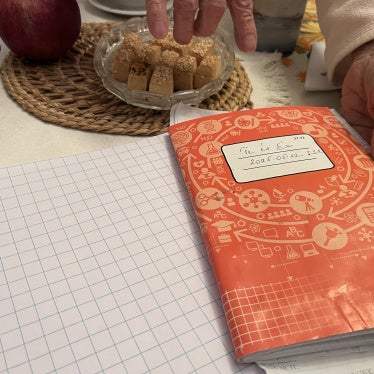(Berlin) – Kyrgyzstan police held about 70 activists, most of them women, for hours on March 8, 2020 without telling them the grounds for their detention or providing access to lawyers, Human Rights Watch said today. The activists had themselves come under attack at the peaceful International Women’s Day march in Bishkek, Kyrgyzstan’s capital. At least three journalists were also detained.
A mob of men, many wearing medical masks or other face coverings, attacked the activists as they were beginning the march to call attention to the serious problem of violence against women in Kyrgyzstan. The masked men threw eggs at the marchers, dragged them to the ground, and destroyed their banners, activists and media reported. When police arrived, the mob dispersed, but rather than seeking out the attackers, police forced the activists to board a bus and took them to Bishkek’s Sverdlovsk police station. Some reported physical abuse by the police.
“People should be protected, not penalized, when exercising their right to assemble and protest peacefully,” said Hillary Margolis, senior women’s rights researcher at Human Rights Watch. “Instead, on a day meant to celebrate women’s rights, these activists were doubly punished – first by an angry mob and then by the police.”
Kyrgyzstan’s parliament held a hearing on March 11 on the disruption of the Women’s March to question the Interior Ministry and the General Prosecutors’ office. The deputy minister of culture, information and tourism, Nurzhigit Kadyrbekov implied that the marchers intentionally stoked a response from officials, saying that “they came out to create a stir and to create a sensation” in order to “create hype.”
The authorities should investigate the circumstances around the mass arrests and the attacks on the activists and bring those responsible to justice, Human Rights Watch said.
The march was an act of solidarity and protest against domestic violence, forced marriage, and other forms of violence against women and girls, which remain persistent problems in Kyrgyzstan despite measures such as a revamped domestic violence law. At least four women have been killed in domestic abuse incidents since the beginning of 2020.
Local media reported police representatives as saying that the marchers were detained for failure to notify the internal affairs bodies about the rally so that they could ensure public safety. In the days leading up to the planned march, a city government request for a temporary ban on public events remained in question.
A Bishkek lawyer following the case confirmed to Human Rights Watch that six protesters were charged with disobedience to a police officer, which carries a fine of 3,000 to 6,000 soms (around US$43 to $86). Five of the attackers were also charged with and fined for the same offense.
Monitoring experts from the Office of the Ombudsman, a human rights oversight body appointed by parliament, were denied entry to the police station to visit detainees, the office said in a statement. The office said it is pursuing disciplinary action against the police officers who denied their staff entry. Detainees were also denied access to lawyers.
“You are waiting for protection from the law enforcement, but suddenly it turns out that you are being detained and it is not even clear why,” one detained activist told Human Rights Watch. “Any confidence and a sense of security is lost. I don’t feel I live in a law-abiding country anymore.”
In early March, the government temporarily banned all “cultural events” as part of measures to prevent the spread of coronavirus. At the request of the city administration, on March 5, the Bishkek district court banned “rallies and peaceful gatherings,” including the Women’s March, until July 1. Women’s March organizers questioned the rationale for cancelling the March, citing exchanges during the court proceedings indicating the ban targeted the Women’s March based on its links to feminism and, in past years, lesbian, gay, bisexual, and transgender (LGBT) people’s rights.
On March 6, the Bishkek city administration withdrew its request. On March 9, the Bishkek city prosecutor’s office found the restrictions on the right to “rallies, marches and other events” to be unlawful.
Following the interruption of the Women’s March, activists held a rally on March 10 to protest violence against women and show solidarity with survivors. Over 400 people attended the peaceful demonstration in Bishkek, local media reported. Activists who took part in the March 8 events said that the detentions may have helped draw much-needed global attention to their fight against domestic and other gender-based violence in Kyrgyzstan.
“It was thanks to these aggressors that the whole world knows how bad things are for women’s rights in Kyrgyzstan,” Dinara Oshurakhunova, a human rights activist who was among those detained, told Human Rights Watch.
Attacks on this year’s Women’s March are the latest in a pattern of opposition to events promoting women’s rights. Members of a conservative nationalist movement objected to artwork incorporating nudity at a November 2019 feminist art exhibit at the National Art Museum in Bishkek and accused the artists of “perverting young people.” The museum’s art director resigned after being subjected to verbal abuse and threatened with rape.
In March 2019, an International Women’s Day rally in Bishkek led to controversy and threats of violence when conservative lawmakers and members of a nationalist group objected to inclusion of LGBT people in the march, which promoted “equality for all.”
“Women’s March participants were simply calling for action to stop women’s needless deaths from domestic violence,” Margolis said. “The authorities should detain and investigate the men who used force to stop this march, not the women who were calmly protesting.”









